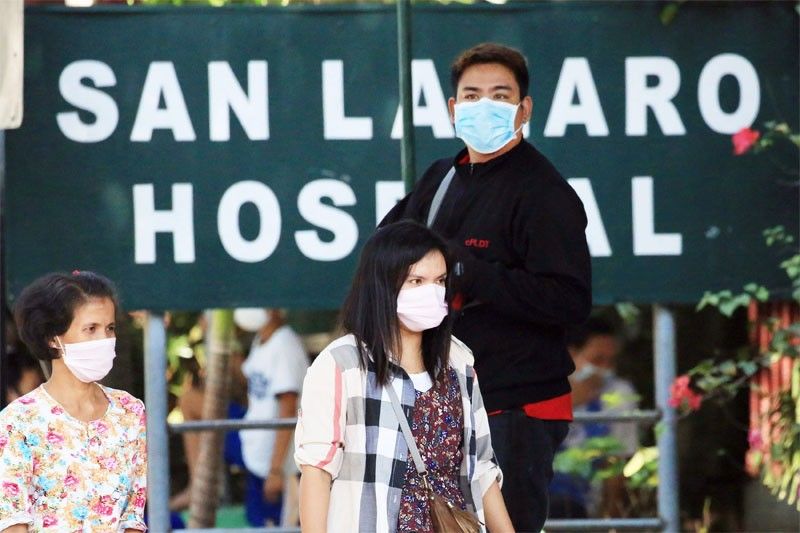DOH confirms first case of nCoV in Philippines

MANILA, Philippines — A 38-year-old female tourist from Wuhan City in China – the epicenter of the global novel coronavirus contagion – has been recorded as the first confirmed case of nCoV infection in the Philippines, the Department of Health (DOH) announced yesterday.
Health Secretary Francisco Duque III told a press briefing that the unnamed Chinese woman tested positive and is now confined in a government hospital where she was admitted on Jan. 25 or four days after arriving in the country.
“She is currently asymptomatic or no longer manifesting symptoms of the respiratory infection,” Duque said.
He did not name the hospital, but Sen. Christopher Go said it was San Lazaro Hospital in Sta. Cruz, Manila.
Go said the problem is “contained,” as health officials and doctors were meticulously attending to the patient’s needs. “What’s important is to keep the virus from spreading.”
Duque said DOH health facilities are prepared to receive and care for individuals with confirmed 2019-nCoV infection as well as those under observation.
Ferchito Avelino, DOH Epidemiology Bureau director, said they are now in the process of identifying people who might have come into contact with the nCoV patient.
Since the patient had visited Cebu and Dumaguete, Avelino said they are coordinating with Center for Health and Development in Central Visayas and the Bureau of Quarantine (BOQ) for the task of tracking other possible carriers of the virus.
“After getting the flight details, we will identify the co-passengers and we are also looking at establishments where they stayed so the employees who had contact with the patient can be advised to undergo mandatory quarantine and observe if they are manifesting symptoms of the infection,” Avelino said.
The health chief said the patient arrived in the country from Wuhan, China via Hong Kong last Jan. 21. She sought medical consultation after experiencing mild cough.
Blood and tissue samples taken from the patient were sent to the Victorian Infectious Disease Reference Laboratory in Melbourne, Australia. Laboratory results showed she is positive for the virus.
Health Undersecretary Eric Domingo said the confirmed case was among six patients whose swab samples were sent to Australia. The five others tested negative of the virus.
Duque assured the public that all necessary precautionary measures are being undertaken to prevent the spread of nCoV in the country.
“The Department of Health is on top of this evolving situation. We were able to detect the first confirmed case because of our strong surveillance system, close coordination with World Health Organization (WHO) and other national agencies and the utilization of DOH’s decision tool,” Duque noted.
He said the DOH is working closely with the hospital where the patient is confined and has activated an Incident Command System so it could effectively manage the medical emergency.
The health chief further noted the BOQ remains on high alert and is in constant coordination with authorities from all ports of entry for stricter border surveillance.
Inter-agency meeting set
An inter-agency task force, he said, will convene a high-level meeting today to discuss the latest development.
Duque said the DOH so far has recorded 29 persons under investigation (PUIs) for nCoV. Of the number, 23 are still confined in different hospitals nationwide and the rest have been discharged.
He said 18 PUIs are in Metro Manila, four in Central Visayas and three in Western Visayas.
Mimaropa, Eastern Visayas, Northern Mindanao and Davao have one PUI each.
The five PUIs discharged, Duque said, are still under strict monitoring. DOH also reported one PUI death.
“I urge the public to stay calm and remain vigilant at all times. Let us continue to practice good personal hygiene and adopt healthy lifestyles,” Duque said.
Domingo, meanwhile, said local testing for nCoV is being upgraded to ensure release of results within 24 hours.
“They are now doing the dry run for the nCoV confirmatory testing after setting it up for 24 hours,” Domingo said.
WHO country representative Rabindra Abeyasinghe said a total of 6,065 nCoV cases, including 132 deaths, have been recorded globally. The figure, he said, does not include new cases from China.
Abeyasinghe said nCoV mortality rate is less than three percent – considered much lower than the figure for other coronavirus infections. WHO was set to meet last night to discuss whether the raging nCoV infection should be treated as a public health emergency of international concern.
“If WHO decides to classify nCoV as public health emergency, we would work with member states to actively stop transmission of the virus which may include restriction,” he said.
At this time, he said, the WHO does not consider nCoV as more infectious than other coronaviruses despite the high number of cases worldwide.
“The numbers we have currently does not support them,” he pointed out.
Duque also said he will recommend restricting travelers from the entire Hubei province, whose capital is Wuhan. The travel restriction may be expanded depending of the assessment of WHO, he said.
“I am in agreement with DOH and we will recommend, if necessary, to impose temporary restrictions of travel for those from the entire province of Hubei while assessing if there is a need to add to the list with travel restrictions more places affected by the infection,” Go said, in reaction to Duque’s statement.
The senator stressed President Duterte has not ordered a specific ban on Chinese because other countries have reported cases of nCoV.
“It will not be proper if we will single out China alone,” he said.
As chairman of the Senate committee on health, Go said he has scheduled a meeting on Feb. 4 with officials of concerned agencies like the DOH and the Department of Foreign Affairs.
“Our priority is to lay down measures to help ensure the safety of Filipinos,” he said.
“Let us not panic, but at the same time, let us take the threat seriously and cooperate with authorities.”
UP pitches in
Meanwhile, experts from the University of the Philippines-Philippine Genome Center (UP-PGC) said the country has the capability to verify nCoV cases.
“The Philippines has the tools and cutting-edge equipment, trained DNA sequencing staff and scientists to help validate the presence of 2019-nCoV in the country by sequencing the whole viral genome from samples collected from patients,” said molecular biologist Cynthia Saloma, executive director of the UP-PGC.
The UP-PGC, she said, boasts of having “next generation” DNA/RNA sequencing (NGS) equipment that will allow them to help the Research Institute for Tropical Medicine (RITM) and the DOH in confirming suspected nCoV cases in the country.
“The frontline hospitals led by the RITM will confirm cases through RT-PCR (reverse transcription-polymerase chain reaction testing), and what the Philippine Genome Center can do is to confirm the sequences obtained through the real time PCR method or better still, perform whole viral genome sequencing through our Next Generation DNA sequencing machines/equipment units followed by bioinformatics analysis to analyze the sequences,” Saloma explained.
“This will allow us to have a picture of the nCoV strains and compare it with those isolated from other countries. The scientific community has banded/brought together the whole genome sequences of viruses in their countries to allow researchers access. The PGC’s DNA Sequencing Core Facility was primarily conceived to help our local researchers for situations like this,” she pointed out.
The UP-PGC was able to get the necessary genomics equipment with funding support from the Department of Science and Technology and the Commission on Higher Education.
“We’ve been providing sequencing services for research, equipment-use and training to public and private R&D institutions and hospitals,” said Dr. Benedict Maralit, research faculty of UP and head of the UP-PGC DNA Core Sequencing Facility. – Rainier Allan Ronda, Rudy Santos
- Latest
- Trending































